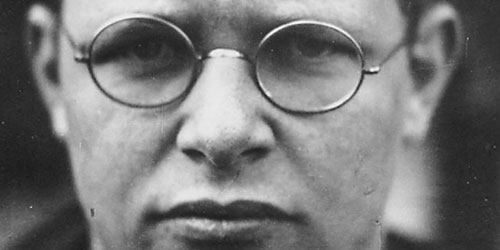Why is Bonhoeffer experiencing such popularity among evangelical Christians at the moment? What is the appeal of his life and message that we find so attractive – and is that attraction legitimate?
I was first introduced to Bonhoeffer’s life in a Focus on the Family Radio Theatre production titled “Bonhoeffer: The Cost of Freedom.” More recently, Eric Metaxas wrote a biography of titled Bonhoeffer: Pastor, Martyr, Prophet, Spy. This biography has been critiqued by Bonhoeffer historians because of the way Metaxas equates Nazism and liberal theology. In the reviews I’ve read of the book, these critics consistently cite a sentence regarding Bonhoeffer’s return from a year in America in 1931: “Here they were fighting against the corrupting influences of the theologians at Union and Riverside (Church), and at home the fight was against the Reich church.” These critics (including Victoria Barnett) argue that this is a simplistic reading of Bonhoeffer’s thought and it does not account for some of the more liberal theology he espoused in prison.
But this is not Metaxas’ first biography; he also wrote a life of William Wilbeforce to accompany the 2007 movie Amazing Grace. I think the thing that links the two is a connection between faith and political activism. This is attractive for modern evangelicals, who want a historical defense for their political involvement. This makes heroes who attack accepted social villains (slavery, Nazism) especially attractive: their struggle is (for the most part) against an uncontroversial evil. If modern evangelicals read their own narrative onto this, they see themselves fighting forces that will eventually be evaluated as just as evil in the court of historical opinion. The other attraction of this type of biography and hero is that it shows that faith need not be a pernicious influence in the sphere of public affairs; it can be a motivating force for social justice. (See, in this vein, the interest over D. Michael Lindsay’s Faith in the Halls of Power: How Evangelicals Joined the American Elite.)
All of this brings me back to Life Together, which is emphatically not a book about Christian political activism. In chapter 1, Bonhoeffer cautions against holding our current communities up against some ideal form of community that is usually not attainable and only serves to make us discontent with the community we have now. This is in the context of Christian communities (churches, etc.), but I think the principle of gratitude he encourages can be applied to the political sphere as well. Chapter 4 on ministry details the ministry of holding one’s tongue, of silence, and of bearing — specifically of bearing the burden of other Christians’ freedom. This quote struck me most forcefully:
It is, first of all, the freedom of the other person … that is a burden to the Christian. The other’s freedom collides with his own autonomy, yet he must recognize it. He could get rid of this burden by refusing the other person his freedom, by constraining him and thus doing violence to his personality, by stamping his own image upon him. But if he lets God create His image in him, he by this token gives him his freedom and himself bears the burden of this freedom of another creature of God. The freedom of the other person includes all that we mean by a person’s nature, individuality, endowment. It also includes his weaknesses and oddities, which are such a trial to our patience, everything that produces frictions, conflicts, and collisions among us. To bear the burden of the other person means involvement with the created reality of the other, to accept and affirm it, and, in bearing with it, to break through to the point where we take joy in it. (101)
I took several things away from this comparison between Bonhoeffer-in-his-own-words and Bonhoeffer-in-the-Evangelical-imagination:
- Christian community cannot be reduced to gossip sessions at coffee shops and shared music tastes (although those things may play a part). It is an intellectual pursuit that involves reading scripture together, a physical pursuit that involves cooking and caring for each other, and it can be messy. Christ calls the broken; is it therefore shocking that churches sometimes look more like psychiatric wards than model communities? The paradox of Christian community is that we are called to Christ’s perfection, but that perfection involves loving imperfect people.
- Christian community involves freedom and therefore disagreement. One of the fundamental projects of Christian community must, then, be some agreement about how to manage disagreement. “Settling” disagreements may be too strong a term, since healthy Christian community should allow for a great degree of diversity.













